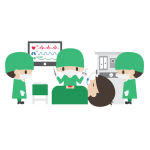Research is an essential aspect of medical studies but unfortunately, institutions in Pakistan lay very little emphasis on it particularly because of lack of professional research mentors, funds and utter lack of determination in students to perform research. This blog is intended to help all those students who think THEY CAN but don’t find a way of doing research because of lack of basic guidelines. All of the information here is compiled mostly from Journal of Pakistan Medical Association website and guidebook “Medical Writing” Second Edition by Pakistan Medical Journalists Association.

Step 1: The philosophy behind your research
The first thing you need to do is to explain to yourself that why exactly you want to do research? The answer to this question will eventually prove to be the motivation for your task. There is no correct answer to this question since the answer would vary from person to person depending on their level of determination. Some might want to do research only because it fascinates them, Some might say that they want to try and test their ideas or for sharing experiences with others. Others might want to do is a part of their curriculum, to add it to their resume, to gain professional growth through research or because they want to peruse a career in research medicine.
Nevertheless, no matter what reason you have for doing research ultimately it adds to medical facts to improve health care.
Step 2: Finding a mentor
It is recommended (but not mandatory) to connect with research mentors in one’s own professional environment, which is not that difficult as the experts involved in research are usually well known among their peers. They are generally willing to teach what they learned through their mistakes and they are very resourceful in providing valuable tips, especially in the initial phases.
Step 3: Planning
With the help and supervision of your mentor you plan what you intend to do by considering all pros and cons of your work and by deciding the setup, sample, methodology, and ethical considerations etc of your topic. Modern medical research is considered almost impossible without basic knowledge of internet and computer skill hence the use of these must be an important part of planning.
Step 4: Execution
After all the mental work it’s time for action. You start by writing a synopsis (proposal) along with the study tool (questionnaire) and send it for a review to another mentor (sometimes this isn’t required) or ideally to the institute’s ethical board (in some institutes it is also called Institutional Review Board or Research Committee). After your proposal is approved, you start intervention (which might be collecting the required data through a survey or bench work as in lab studies or clinical work) for your topic. Collection of data may take a variable time depending on the research question. After data collection, data is analyzed and results are drawn. The last step of this phase is writing a paper and submitting it for publication.
Step 5: Types of medical writing
A necessary conclusion to research can be made in the ways said below. The detail of each type is beyond the scope of this blog.
- Original research
- Commentary (on a published paper)
- Letters to the editor
- Case reports
- short communication
- Review article (including systematic reviews, meta-analysis) -Thesis and dissertations
- Conference reports
Step 6: Presenting your work to journal clubs or M&M meetings
Journal clubs: The growing trend of journal clubs in teaching hospitals in Pakistan are eventually proving the basic pillar of research for beginners in medical collages and hospitals but the determination, zeal and preparation of the researcher count most here.
Mortality and morbidity (M&M) meetings: provide an opportunity for analytically thinking the causes of mortality in the hospital. Similar to journal clubs, they allow the students to develop the important habit of critical thinking and review of the topic under discussion leading to intellectual detailing in their works.
Step 7: Getting you research paper published
Getting your research paper published is not a difficult task but a tiring one and involves the following steps:
- Searching for an appropriate journal to which you may send your research to
- Fulfilling the criteria and requirements of the journal
Step 8: Do not be afraid of failure
Failures are a big part of research process. Failure often precedes success. The word success often changes its mean as one grows in the field of research. Failure makes the performer resilient and proves to be the push in continuing your goals in research, its process and publications. Research papers get rejected all the time, you get negative results many time but don’t be afraid. Best of the best papers have faced rejections. People usually consider negative findings as a failure rather they are equally as important as positive results
Fears and myths regarding research:
Most of the juniors and even some senior students/doctors think research is very difficult, time-consuming and expensive. On the contrary, it is not as difficult as portrayed or as expensive as it is thought to be. There are several organizations which offer research grants to cover the expenses of the research.
Second greatest fear is the rejection of a paper or fear that research would not get published. Stronger the methodology the easier will it be to get it published. Each and every paper can get published if you drive wisely.
Author’s note:
I hope this blog gives you an idea about medical research and its process. I thoroughly believe that every little idea can be a big idea if it is considered and processed in a good way. Maybe it’s your idea the world is waiting for…
Acknowledgment:
The author gratefully acknowledges the assistance of Dr. Sara Sadiq MPhil, Zia Uddin University for reviewing and editing this article.


![Special Pathology Viva Questions [4th Year MBBS] Special Pathology Viva Questions](https://www.medicosrepublic.com/wp-content/uploads/2018/06/Special-Pathology-Viva-Questions-218x150.jpg)











![Gerstmann Syndrome Features Mnemonic [Easy-to-remember] Gerstmann Syndrome Features Mnemonic](https://www.medicosrepublic.com/wp-content/uploads/2025/06/Gerstmann-Syndrome-Features-Mnemonic-150x150.jpg)
![Cerebellar Signs Mnemonic [Easy to remember] Cerebellar Signs Mnemonic](https://www.medicosrepublic.com/wp-content/uploads/2025/06/Cerebellar-Signs-Mnemonic-150x150.jpg)
![Seizure Features Mnemonic [Easy-to-remember] Seizure Features Mnemonic](https://www.medicosrepublic.com/wp-content/uploads/2025/06/Seizure-Features-Mnemonic-1-150x150.jpg)

![Recognizing end-of-life Mnemonic [Easy to remember]](https://www.medicosrepublic.com/wp-content/uploads/2025/06/Recognizing-end-of-life-Mnemonic-150x150.jpg)

![Multi-System Atrophy Mnemonic [Easy-to-remember] Multi-System Atrophy Mnemonic](https://www.medicosrepublic.com/wp-content/uploads/2025/06/Multi-System-Atrophy-Mnemonic-150x150.jpg)

![How to Remember Southern, Northern, and Western Blot Tests [Mnemonic] How to Remember Southern, Northern, and Western Blot Tests](https://www.medicosrepublic.com/wp-content/uploads/2025/06/How-to-Remember-Southern-Northern-and-Western-Blot-Tests-150x150.jpg)









